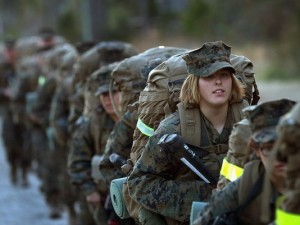
For new Marine commandant, the issue of women in combat is already moot
Newly installed Marine Commandant Gen. Robert Neller made some pointed comments regarding women in combat last week, following a public back-and-forth between the Marine Corps and the secretary of the Navy over whether the Marines would allow women into previously closed ground combat roles.
“This has nothing to do about women in combat,” Neller said on Thursday to a theater full of Marines at Marine Base Quantico in Virginia.”I buried three women in Iraq in 2006 and they died alongside 311 men.”
“To me, it’s personally insulting to talk about women in combat. Women have been in combat,” he added.
Neller was dismissing the idea that including women in combat was anything new, and he pointed out that the debate was about women being directly assigned to positions in ground combat units such as the infantry.
The Marine Corps is perhaps on the verge of being the only military service that has asked for an exemption. While it has not publicly stated that it will seek to keep ground combat positions closed to women, then-Commandant Joseph Dunford in September asked Navy Secretary Ray Mabus for an exemption to the 2013 mandate that all jobs in the military be made open to women by the coming new year, according to Marine officials.
According to the officials, Dunford requested that Marine infantry and reconnaissance units remain closed to women.
“General Dunford, when he was still commandant, made his recommendation on this issue to the secretary of the Navy,” Neller said. “And right now it is the policy of the Marine Corps that we’re not going to talk about what that recommendation was because we’re going to let the secretary of defense make his decision.”
Neller’s silence on that stance comes after a somewhat public clash between the Marine Corps and Mabus. In September, the Marine Corps released a four-page summary of a nine-month experiment, known as the Ground Combat Integrated Task Force. The summary indicated that women were more prone to injury and performed poorly at a majority of infantry-focused tasks in comparison to their male counterparts.
Upon release of the summary, Mabus pushed back on the experiment, almost discounting it entirely by saying that the women tested should have had a “higher bar to cross” to get into the study and that the Marines carrying out the experiment had a predisposed mind-set from the start.




